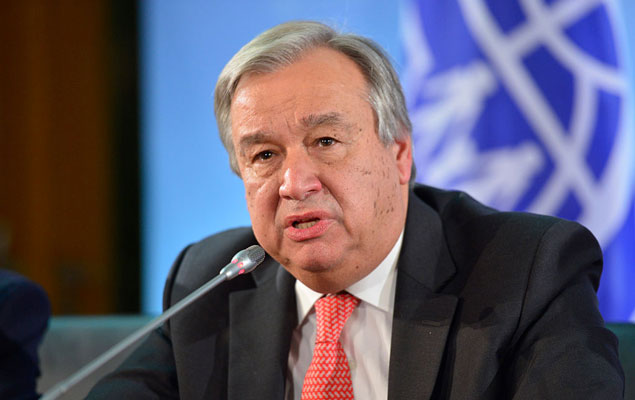
editorial comment
Protests in cities across the world in recent days show that, “people are hurting” and want to be heard “by political leaders” who must now address a “growing deficit of trust”, said United Nations chief Antonio Guterres.
The UN General Assembly is one of the six principal organs, the only one in which all member nations have equal representation, and the main deliberative, policy-making and representative organ of the UN.
The UN — especially during General Assembly sessions is very much like a permanent political convention where caucusing, cajoling, horse-trading, arm-twisting and passionate oratory are a incessant — but where nobody ever gets nominated.
We seem to have a little concern about the resolutions approved at the UN or some other international bodies. More often than not, we are not aware of them at all. Journalists prefer resolutions on global matters — arms control, regional conflicts, water security, nuclear deals, refugees, migrants, terrorism and environmental issues.
However every session of the UN General Assembly adopts almost a hundred resolutions on socio-legal and humanitarian issues alone. Experts only know that any resolution reflects a step forward in the solution of real problems with a bearing on both government and all of us is not just a consummation of empty debates. The trouble is, however we are little conscious of it.
This is the starting point from which one could build a bridge to a genuine people’s diplomacy. That is not the diplomacy that condescendingly opens up its secrets to the people or is carried out amateurishly, but the diplomacy that reflex vox populi, its sovereign will and the interests of groups of citizens.
This can only be achieved under conditions when every rank and file member of society from his/her younger years becomes aware of himself as a citizen and a personality is conscious of the range of his/her rights beginning with the international standards of human rights and basic freedoms.
- Chamisa under fire over US$120K donation
- Mavhunga puts DeMbare into Chibuku quarterfinals
- Pension funds bet on Cabora Bassa oilfields
- Councils defy govt fire tender directive
Keep Reading
Zimbabwe citizens like citizens of any other country, must have a clear idea about the existing system of agreements containing internationally recognised norms and standards on human rights. There are today more than 20 fundamental human rights agreements, including the universal Declaration of Human Rights and international covenants, to most of which Zimbabwe is a signatory.
From the end of Second World War, America tried to alchemise its own sense of constitutionalism, due process and civil liberties into rule book for the world. Eleanor Roosevelt, the president’s widow, led efforts to agree the Universal Declaration of Human Rights, which in 1948 promoted the values enshrined in the US constitution. “We wanted as many nations as possible” she said, “to accept the fact that men, for one reason or another, were born free and equal in dignity and rights, that they were endowed with reason and conscience and should act towards another in a spirit of brotherhood.”
Is it enough merely to publish and distribute them in thousands over the country (which incidentally has not been done yet) for the message of these documents to sink in?
The need to grasp the meaning of the international agreements on human rights agreements and analyse them is necessitated by the readiness of man’s perception and his mind to absorb them to feel the urgency for them.
The shaping of this urge is an important direction in the activities of the UN Centre for Human Rights based in Geneva. A UN official speaks with conviction about the need to reach a special “human rights culture”. The general knowledge of international human rights standards, the uniformity of their interpretation and their strict observance are an earnest for the stable and harmonious development of the state in terms of domestic politics and the factor of civilised and even international relations.
We should begin with small things, for instance help the child at school become aware of his/her rights and not only within the range of his/her family or the region the resident of which he/she is but also a citizen of his/her country a member of the world community. We should teach them to use these rights correctly, not to the detriment of the country, other people to rule out anarchy.
People should learn to defend their rights and human dignity enlisting for this purpose time tested institutions, constitution, parliament, courts, public opinion, media etc. Many UN resolutions of which we know very little are aimed at the solution of the whole package of the above mentioned problems.
Is the world still lacking information, which could explain in clear and simple terms to a certain audience particularly children, young people, students, the indigent and marginalised communities the essence of concepts and norms in the human rights field and which could be disseminated through social digital platforms and mass media nationwide?
The UN is not by no means all blah. Useful, often unpublicised work is done behind its glass façade. The UN’s various specialised agencies are quietly laying the foundation stones of that peaceful, integrated world order that will one day have to be built if mankind is to survive.
The UN is also a place where nations can settle their quarrels without losing face; it’s easier to give way to the world organisation than to your opponents. And it’s a great equalizer-it’s where any country, no matter how small and poor and weak, can hold its own with the superpowers; it’s where steam gets let off.
As Sir Gladwyn Jebb once said, “The UN has become a mirror of the world, and if we don’t like what we see, let’s not blame the mirror.” Tamsanqa Mlilo
l Tamsanqa Mlilo is the director at Mediation for Peace and Human Rights Centre and is a human rights activist and social commentator. E-mail: tammlilo@hotmail.com










